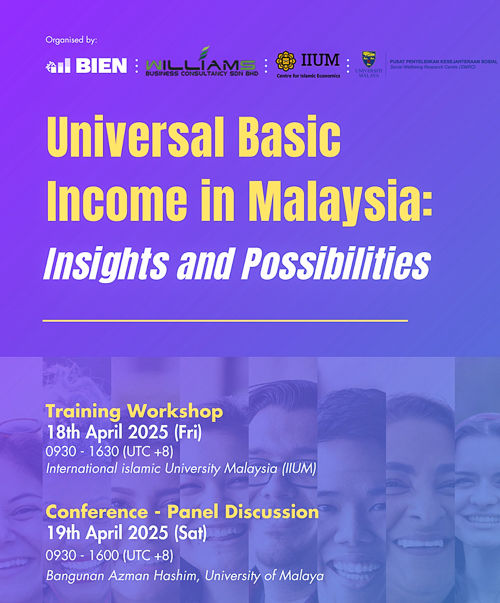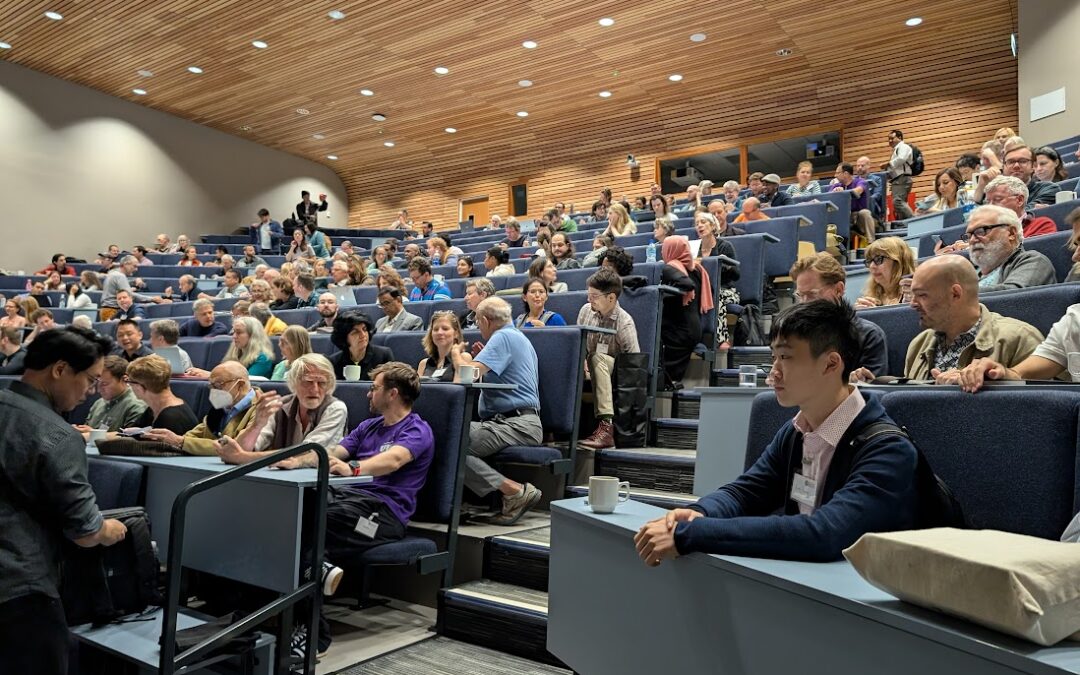
by Professor Geoffrey Williams | Apr 1, 2025 | Events, News
Join us for our 2-day workshop and conference with panel sessions introducing the principles and practice of a Universal Basic Income, the opportunities for Malaysia and the potential means of implementation.
Register Here: https://lnkd.in/g9QcXhha
Session Themes:
· Basic Income Overview,
· Global Overview of UBI,
· Findings from the Pilots,
· Screening of the film: ‘Unconditional
· Social Protection in Malaysia
Facilitated Discussions on:
· Designing UBI policies;
· UBI for Malaysia;
· Economics of funding a UBI for Malaysia;
· Addressing Income Insecurity
Day 1 – Training Workshop
CENTRE FOR ISLAMIC ECONOMICS – International Islamic University Malaysia
9:30am – 4.30pm, 18th April 2025, Friday
Day 2 – Conference
AZAM HISHAM AUDITORIUM – UNIVERSITI MALAYA
9:30am – 4:00pm, 19th April 2025, Saturday
Register Here: https://lnkd.in/g9QcXhha
Fee: Workshop: RM30; Conference RM30; Package RM50 (Workshop and Conference) – Free to partners, students and media
Basic Income Earth Network | Centre for Islamic Economics (CIE-International Islamic University Malaysia (IIUM) | Social Welfare Research Centre (SWRC- Universiti Malaya) | (AMEU: Association of Malaysian Economics Undergraduates) | Higher Education Youth Association (HEYA Inc) | Perdana Fellows Alumni Association (PFAA)
Media Partner – FMT News (Free Malaysia Today)
Moderators: Dashran Yohan | Hazween Hassan | Mohamad Shafiq bin Sahruddin | Kar Ling Wong
Panelists: Dr Sarath Davala | John Michael | S K Lee | Professor Geoffrey Williams | Shaun Kua | Dr Amjad Rabi | Ridhwan Rosli | Dr. Muhammad Irwan Ariffin | Malcolm Wong |Dr @Michael Jeyakumar | Prof Norma Mansor

by Scott Jacobsen | Mar 19, 2025 | News
Dr. Malcolm Torry, a British academic, has been a leading researcher on basic income for more than 40 years. As Director of the Citizen’s Basic Income Trust (CBIT) from 2001 to 2020, and General Manager and then Treasurer of the Basic Income Earth Network (BIEN) from 2016 to 2024, he played a key role in policy discussions and economic research. In this interview, he discusses basic income’s history, feasibility, and societal impact, addressing its effects on employment, automation, welfare policy, and human dignity. He argues that basic income does not disincentivize work, can be a stabilizing force, and requires proper pilot projects in developed economies to measure its full effects.
Scott Douglas Jacobsen: Today, we are with Malcolm Torry, a British academic and researcher who specializes in basic income and the management of religious organizations. He holds multiple advanced degrees in psychology, economics, and social policy, though we do not necessarily need to list them all. If it runs through the journal, it gets fact-checked—the journal is live.
Dr. Torry served as Director of the Citizen’s Basic Income Trust (CBIT) from 2001 to 2020, where he played a crucial role in developing and promoting basic income research. His extensive work includes publications such as Basic Income: A History and Citizen’s Basic Income: A Multidisciplinary Approach. His research has significantly contributed to welfare policy discussions and religious institution management, influencing academic circles and public policy debates. He has recently had an interest in Continental Philosophy.
So, thank you very much for joining me today. I appreciate you taking the time out of your day for a little Canadian me. Now, in 1985, basic income came into your world. How? Why?
To read the full article, click here.

by Tyler Prochazka | Mar 13, 2025 | News
Research presented at the 2024 BIEN Congress explores China’s possible shift from existing social assistance programs toward Universal Basic Income (UBI), raising insights into poverty alleviation and social equity.
Conducted by interns Zhao Muge, Wu Yifan, and Huang Xinhe under the guidance of scholars Cheng Furui and Ye Jiabin, the study titled “Can China Move Towards the UBI?” evaluates China’s current Minimum Livelihood Guarantee (Dibao) and targeted poverty alleviation policies, proposing UBI as a potential next step.
The study highlights that China’s Dibao policy, intended to provide a minimum living allowance to low-income households, initially showed strong results in poverty reduction—particularly evident in rural areas. For example, a 1 percent increase in rural Dibao expenditure corresponded to a 6.8 percent reduction in poverty in regions like Shanxi Province from 2008 to 2018. However, over time, Dibao’s effectiveness declined due to welfare dependency, stigmatization of recipients, and administrative inefficiencies, including inadequate adjustment mechanisms for benefit standards and cases of resource misallocation. From 2015-2016, the reduction in the poverty rate in some parts of China was less than 30 percent.
Transitioning from subsistence allowances to targeted poverty alleviation was a necessary step to improve the efficiencies of the program, the study’s authors argued. The number of rural Dibao beneficiaries began to surpass urban beneficiaries around 2007 and peaked in 2013, prompting China to implement targeted poverty alleviation policies. From 2018 to 2020, the number of rural beneficiaries vastly exceeded urban beneficiaries, emphasizing the critical need for interventions targeting rural poverty. Next, the study discussed the advantages of targeted poverty alleviation compared to subsistence allowances. Case studies showed that targeted poverty alleviation can be implemented through infrastructure development, industry support, education, and other means. Compared to Dibao, targeted poverty alleviation places more emphasis on enabling self-development through comprehensive measures. As a result, it has a broader scope, more projects, and is more comprehensive and in-depth, leading to sustainable poverty alleviation.
The research also explores the theoretical and practical groundwork supporting UBI implementation in China. Theoretically, UBI aligns with China’s goal of common prosperity and narrowing the wealth gap. Practically, the COVID-19 pandemic provided an experimental foundation through widespread government-issued consumption vouchers, which effectively stimulated local economies, with economic multipliers ranging up to tenfold in certain cases.
The paper outlines several feasible pathways for China’s gradual implementation of UBI: using dividends from carbon emissions trading, establishing a permanent citizen trust fund financed by state-owned enterprises, adopting negative income tax schemes to enhance employment incentives, and distributing subsidies adjusted according to regional poverty lines and demographic factors.
Despite recognizing challenges, such as funding sources, potential increased tax burdens, and the risk of disincentivizing labor participation, the research strongly supports the viability and potential benefits of UBI. Ultimately, the authors conclude that by carefully addressing these challenges, China could successfully integrate aspects of UBI into its social welfare system, significantly reducing poverty, enhancing social equity, and driving sustainable economic growth.

by Scott Jacobsen | Feb 20, 2025 | News
Prof. David Nettle is a researcher in the Evolution and Social Cognition team at the Institut Jean Nicod, Paris, and a Professor at Northumbria University. His research spans the biological and social sciences, focusing on economic and social inequality, trust and cooperation, adversity and aging, food insecurity, and moral and political cognition. He is also interested in interdisciplinary synthesis, open science, and the application of research to public policy. His publications are freely accessible, along with an introductory R and statistics course. He has authored several books and maintains a blog on science and society.
Scott Douglas Jacobsen: How does basic income address the roots of economic inequality?
Prof. David Nettle: Basic income, under the scheme we propose, does two things.
First, it is redistributive, meaning that it brings the incomes of the poorest households much closer to the median, whilst taking from the very richest ones. It does this because we couple it with a progressive income tax. The richest households get their basic income, but it is clawed back from them through income tax. The poorest household are net gainers. Thus, basic income takes over the function of the existing welfare state in a simpler way.
To read the full interview, click here.

by Scott Jacobsen | Feb 10, 2025 | News
Dieter Althaus has been serving as the Vice President of Governmental Affairs at Magna Europe since 2011. In this role, he is responsible for managing relationships with governmental entities and overseeing corporate affairs within Europe.
Scott Douglas Jacobsen: What inspired advocacy for the “Solidarity Citizen’s Income” (Solidarisches Bürgergeld) while Minister-President of Thuringia?
Dieter Althaus: Our social system in Germany is becoming a significant problem for proper implementation due to a strong differentiation and quantitative expansion. In addition, the incentive effect for paid or voluntary work is not sufficient.
Jacobsen: How does universal basic income align with principles of the Christian Democratic Union?
Althaus: The basic principles of the solidarity society are preserved. Due to the principle of negative income tax, the system is easy to understand and it is easy to implement.
Jacobsen: What primary economic and social benefits can come from universal basic income for Germany?
Althaus: Work, paid as well as voluntary, pays off and is socially recognized. The negative income tax ensures transparent implementation.
Jacobsen: What challenges emerge from proposing the Solidarity Citizen’s Income?
Althaus: The welfare state would have to be completely rebuilt. The resulting transparent structures prevent abuse and lead to a considerable reduction in bureaucratic costs.
Jacobsen: Is the socio-economic climate in Germany more receptive to basic income since 2006?
Althaus: I do not believe that such a reform would currently be feasible in Germany.
Jacobsen: What advice is pertinent for policymakers and basic income advocates today?
Althaus: I don’t give advice. Our concept is available and could be discussed or implemented in an adapted way. The political will is not present and the potential for defamation is unfortunately great.
Jacobsen: Thank you for the opportunity and your time, Mr. Althaus.






